The Jubilee in Bradford
 On Saturday, I went to the ASDA just off the A6177 Bradford Ring Road to pick up my other half: she was volunteering there with Bradford Trussell Trust Food Bank. The Food Bank are desperately short on supplies; she and others were giving up part of their weekend to provide shoppers information about their work. I helped in a minor way: I went shopping for boxes of juice and tinned meat on the Food Bank’s behalf. As I pushed the cart through the long aisles, I noted that ASDA was a bit less ostentatious than other supermarkets in the area. The bunting wasn’t quite as “in your face” and the patriotic items on sale had more to do with the Olympics than the Diamond Jubilee; I didn’t see any portraits of the Queen.
On Saturday, I went to the ASDA just off the A6177 Bradford Ring Road to pick up my other half: she was volunteering there with Bradford Trussell Trust Food Bank. The Food Bank are desperately short on supplies; she and others were giving up part of their weekend to provide shoppers information about their work. I helped in a minor way: I went shopping for boxes of juice and tinned meat on the Food Bank’s behalf. As I pushed the cart through the long aisles, I noted that ASDA was a bit less ostentatious than other supermarkets in the area. The bunting wasn’t quite as “in your face” and the patriotic items on sale had more to do with the Olympics than the Diamond Jubilee; I didn’t see any portraits of the Queen.
After a bit of searching, I picked up some apple juice, orange juice, chunky chicken and tinned steak and then proceeded to the checkout counter. Ahead of me, there was a mother, father and their small daughter. The mother looked thin, pale and somewhat worried. Her curly brown hair was dishevelled. Her blue eyes darted back and forth as if she was tallying up in her head every item that was rolling across the till’s scanner. The father, tanned and muscular, I presume due to long hours spent working outdoors, appeared just as concerned. His eyes were downcast; he quickly grabbed the items and stuffed them into plastic bags as if they would be taken from him. I suspect the grey hair in his bushy moustache had prematurely arrived. The family’s purchases were modest: they mostly were buying ASDA own-brand “Smart Price” goods. There was a clear preference for pasta and sausage rolls; additionally, they had splurged a bit on a £3 family sized pizza. Only the little girl, dressed in a bright pink t-shirt, seemed truly happy. Her bright eyes peered over the stacks of goods sliding down and being quickly packed up. She was too young to know that money was something to worry about, rather, it magically appeared in Mummy and Daddy’s wallets and allowed them to buy milk and chocolate cereal. As they finished packing up, paid, and departed, I could imagine them retreating to a modest home. Perhaps utility and credit card bills lay stacked on the kitchen table, promising retribution if debts remained unpaid. The father had an almost wistful quality to his look of worry: it was easy to imagine him sitting on a sofa quietly, staring into the middle distance and contemplating all the problems he had to face while sipping an ASDA own brand lager.
I thought of the Queen. I saw from my Twitter timeline that the festivities at Epsom racecourse were imminent. In contrast to the couple who were going to treat themselves on £3 family sized pizza, I guessed she and her entourage probably were going to quaff the finest champagne. I suspect even Cristal was too déclassé: perhaps a special jubilee champagne from a distinguished Maison was on offer. No doubt smoked salmon was acquired from a royal purveyor. The afternoon’s entertainment was surely viewed from a comfortable distance, only subject to the vagaries of the weather. Around the Queen, I was sure, there were the gentlemen and ladies of name and fortune: no doubt shirts from Turnbull and Asser, top hats from Lock and Co, and handbags from purveyors on Old Bond Street prevailed. Is it the same country, I wondered: the distance between Epsom and Bradford seemed vast. No wonder our leaders make policy in such a cack handed way, I mused: they don’t see the families at the McDonalds’ concession at the Bradford ASDA. The Big Macs and fries they people are eating there are not some sort of personal indulgence, this is their main meal. This Britain is not a Disney-like pastiche of Victoriana, rather it is a place where deprivation is all around and there are days even when the sky itself seems to hang too low. The clink of champagne glasses isn’t heard here; the jubilee is for an old lady who seems disconnected and distant. Yes, there will be some festivities. And yes, thanks for the extra days off. However, I get the sense that by and large, there is tolerance, not enthusiasm: the Queen is a marginal fact of life and she rarely intrudes on daily existence. There is as yet no confidence in an alternative, no hope that different would be better. So the system survives.
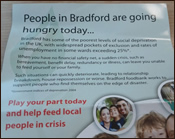 Yet something is deeply wrong. As I waited for my other half to finish up, I read through the brochure the Food Bank was handing out. At the top it stated clearly, “People are going hungry in Bradford today”. It also said that it some wards there is an unemployment rate of 25%; worryingly, the statistic cited is from 2004, prior to the crash. Nevertheless, there were positive stories to be found: a group of students had come into ASDA for some basic supplies and returned with a cornucopia of food to donate. Generosity, warmth and basic decency still exist, despite all the challenges; perhaps, I thought, we ought to take the time to celebrate ourselves.
Yet something is deeply wrong. As I waited for my other half to finish up, I read through the brochure the Food Bank was handing out. At the top it stated clearly, “People are going hungry in Bradford today”. It also said that it some wards there is an unemployment rate of 25%; worryingly, the statistic cited is from 2004, prior to the crash. Nevertheless, there were positive stories to be found: a group of students had come into ASDA for some basic supplies and returned with a cornucopia of food to donate. Generosity, warmth and basic decency still exist, despite all the challenges; perhaps, I thought, we ought to take the time to celebrate ourselves.
Bradford does contain glimpses of what such a celebration might look like. My local church had a Jubliee lunch after the Sunday service; the service itself contained barely a mention of the Queen. Rather, the Gospel reading came from St. Luke, chapter 14; specifically, the portion in which Jesus related the parable of a man who invited all his friends to dinner, yet they found various excuses not to attend. Instead, the man invites the poor, the lame, and the blind from his community and decides to shun his rich friends in future; somehow I had doubts this was how the guest list for dinner at Buckingham Palace was composed.
I looked up Luke 14 as I sat in the pew; verse 11 leapt out at me:
“For everyone who exalts himself will be humbled, and he who humbles himself will be exalted.”
The lunch was a homemade affair: it was held in the church hall, which had been painted a lemon yellow probably in the late 1970s. People brought in and consumed sausage rolls, fresh sandwiches and strawberry pavlovas. They drank coffee and talked. Children wore paper hats made out of paper plates and adorned with glitter. The bunting in the hall was modest, just red, white and blue flags: no Union Flags were in evidence. Only one gentleman, elderly and wearing a tweed jacket, stood up and asked us all to toast the Queen. The few supporters of a Republic kept quiet. After all, it was the only praise she’d received all afternoon.
Nevertheless, the Jubilee is just hitting its stride. The Sunday papers were all emblazoned with the Queen’s portrait. The Sunday Times offered a free spotter’s guide to the Jubilee flotilla; its progress was remarked upon in every last minuscule detail on the BBC. Anneka Rice was drafted in to comment on a series of pictures painted in the rain; many of these were washed out. She suggested they were “impressionistic”; she compared one artist’s work to that of Monet. Other commentators spoke of how “normal” the Queen is, as if it was some sort of praiseworthy quality that she would deign to experience the emotions of less exalted souls. The flotilla’s grand fanale was marked by a series of atonal fog horns being blasted at full volume, and carried live on television by the BBC, Sky and CNN. The news channels are unrelenting in their focus on the Jubilee: it’s so much that I slightly wonder if the midnight broadcast will speculate about the Queen’s sleeping patterns, if she lay on her side or on her back. Bradford, so far away, will finish the last of its beer or celebration cava, turn out the lights, and go to sleep.

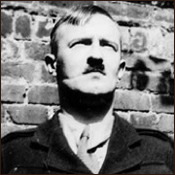 It’s upsetting to see a defence of tyranny coming from a citizen of a free nation. Lord Haw Haw, otherwise known as William Joyce, did his level best to demoralise English-speaking Allied soliders with his radio broadcasts during World War II; he performed this service for a regime that slaughtered 6 million Jews in the Holocaust and inflicted unfathomable suffering on the nations of Europe.
It’s upsetting to see a defence of tyranny coming from a citizen of a free nation. Lord Haw Haw, otherwise known as William Joyce, did his level best to demoralise English-speaking Allied soliders with his radio broadcasts during World War II; he performed this service for a regime that slaughtered 6 million Jews in the Holocaust and inflicted unfathomable suffering on the nations of Europe.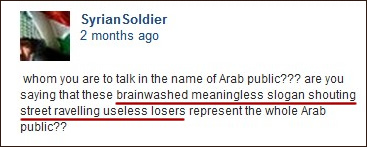
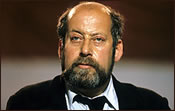 I wish Sir Clement Freud were still alive and serving as the Liberal MP for the Isle of Ely or North East Cambridgeshire (for purely stylistic reasons, I prefer the “Isle of Ely” as a constituency name). I’d like also that he was in a position to speak up about the latest expenses scandal which has embroiled the Conservative Party co-chairperson, Baroness Warsi. No doubt he would say something laconic and brilliant; Warsi would be cut to shreds by his rapier wit, a quality which in contrast she noticeably lacks.
I wish Sir Clement Freud were still alive and serving as the Liberal MP for the Isle of Ely or North East Cambridgeshire (for purely stylistic reasons, I prefer the “Isle of Ely” as a constituency name). I’d like also that he was in a position to speak up about the latest expenses scandal which has embroiled the Conservative Party co-chairperson, Baroness Warsi. No doubt he would say something laconic and brilliant; Warsi would be cut to shreds by his rapier wit, a quality which in contrast she noticeably lacks.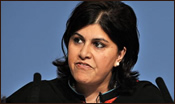 We’re not sufficiently fortunate to have a notable raconteur amongst our parliamentarians; without such an esteemed personage, the words which must be used to describe Warsi’s imbroglio are sharper, less elegant. Quite frankly, she shouldn’t be in her current job. Her career is a marked by a series of mismatches between her station and actual achievement. First, she was a failed parliamentary candidate for Dewsbury in 2005: even though the Conservative Party’s overall electoral performance was far better in 2005 than in the 2001 General Election, she managed to accrue fewer votes than the last Tory who ran for the seat. This should have said something. Nevertheless, Cameron insisted on having her in a leadership position, and thus arranged a peerage; she was made Shadow Communities Minister. He also elevated her to the co-chairperson role with specific responsibility for cities. Veterans of political television programmes are still confused as to why: her answers to pointed questions mostly indicate a lack of intellectual discipline and depth of knowledge. She is also extraordinarily gaffe prone. For example,
We’re not sufficiently fortunate to have a notable raconteur amongst our parliamentarians; without such an esteemed personage, the words which must be used to describe Warsi’s imbroglio are sharper, less elegant. Quite frankly, she shouldn’t be in her current job. Her career is a marked by a series of mismatches between her station and actual achievement. First, she was a failed parliamentary candidate for Dewsbury in 2005: even though the Conservative Party’s overall electoral performance was far better in 2005 than in the 2001 General Election, she managed to accrue fewer votes than the last Tory who ran for the seat. This should have said something. Nevertheless, Cameron insisted on having her in a leadership position, and thus arranged a peerage; she was made Shadow Communities Minister. He also elevated her to the co-chairperson role with specific responsibility for cities. Veterans of political television programmes are still confused as to why: her answers to pointed questions mostly indicate a lack of intellectual discipline and depth of knowledge. She is also extraordinarily gaffe prone. For example,  I don’t remember the first time I saw the Eurovision song contest; I presume it was not long after I moved to Britain. I do recall being appalled: bad, tuneless song followed bad, tuneless song. Worse, the performers were often off key, as if they hadn’t sufficiently rehearsed or were tone deaf. What on earth is going on, I wondered. Why were the nations of Europe participating in this contest? Why were the people around me talking about it so effusively? The only saving grace was the inimitable Terry Wogan’s commentary: he punctured the dreary silliness of the proceedings with sharp and hilarious quips. Nevertheless, I didn’t make a point of tuning into the competition until the advent of the internet: the fun of it is talking about the contest with others, and seeing hundreds, if not thousands continue in the tradition that Wogan set for us to follow. Although his departure from presenting the programme was a great loss which is still keenly felt, at least Twitter is a veritable fountain of verbal barbs that are worthy of the master.
I don’t remember the first time I saw the Eurovision song contest; I presume it was not long after I moved to Britain. I do recall being appalled: bad, tuneless song followed bad, tuneless song. Worse, the performers were often off key, as if they hadn’t sufficiently rehearsed or were tone deaf. What on earth is going on, I wondered. Why were the nations of Europe participating in this contest? Why were the people around me talking about it so effusively? The only saving grace was the inimitable Terry Wogan’s commentary: he punctured the dreary silliness of the proceedings with sharp and hilarious quips. Nevertheless, I didn’t make a point of tuning into the competition until the advent of the internet: the fun of it is talking about the contest with others, and seeing hundreds, if not thousands continue in the tradition that Wogan set for us to follow. Although his departure from presenting the programme was a great loss which is still keenly felt, at least Twitter is a veritable fountain of verbal barbs that are worthy of the master.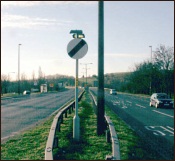 The stretch of the A647 between Bradford and Leeds is a speed camera trap. At first, the signs are clear: the white circle with a thick black line struck through it tell the driver that the national speed limit applies and all’s well. On a late spring day, provided one leaves early enough, this portion of the journey can be almost pleasant. After a few miles, the signs then change to indicate a maximum speed of 60: this isn’t too bad, just a lighter application of the gas pedal is sufficient to ensure compliance. Two speed cameras go by. Then there is a more sudden drop to 40, which is located around a bend: the sign is followed on shortly by yet another camera.
The stretch of the A647 between Bradford and Leeds is a speed camera trap. At first, the signs are clear: the white circle with a thick black line struck through it tell the driver that the national speed limit applies and all’s well. On a late spring day, provided one leaves early enough, this portion of the journey can be almost pleasant. After a few miles, the signs then change to indicate a maximum speed of 60: this isn’t too bad, just a lighter application of the gas pedal is sufficient to ensure compliance. Two speed cameras go by. Then there is a more sudden drop to 40, which is located around a bend: the sign is followed on shortly by yet another camera.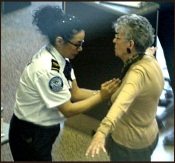 It would be wrong to suggest that this kind of nastiness is solely a British phenomenon. As anyone who travels to the United States these days knows, entering the country can be an extremely unpleasant experience. I am aware of a harmless looking white haired woman in her late 60’s with mobility problems who was once asked by American border officials if she was visiting the country for nefarious purposes, namely to earn income as a prostitute. This is the same country that was
It would be wrong to suggest that this kind of nastiness is solely a British phenomenon. As anyone who travels to the United States these days knows, entering the country can be an extremely unpleasant experience. I am aware of a harmless looking white haired woman in her late 60’s with mobility problems who was once asked by American border officials if she was visiting the country for nefarious purposes, namely to earn income as a prostitute. This is the same country that was 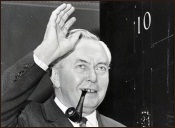 We’ve come so far, only to go backwards. In 1964, the British people elected Labour into power, and more specifically, elevated Harold Wilson to be Prime Minister; his origins were modest, he was born in Huddersfield. His father was a works chemist and his mother was a schoolteacher. He rose through hard work, guile and merit. He was followed in 1970 by Edward Heath, the son of a carpenter. Heath was then followed by Wilson in his second stint as Prime Minister and then by Jim Callaghan, the son of a Chief Petty Officer in the Royal Navy. Callaghan was succeeded by Margaret Thatcher, a grocer’s daughter from Lincolnshire. She handed over the role to John Major, a Brixton lad; his father was a music hall performer. Major was defeated by Tony Blair, whose father was born out of wedlock to two English actors and was subsequently adopted. When Blair retired, Gordon Brown, a son of a Presbyterian clergyman, took over. Given this succession, it was quite possible to believe Major’s rhetoric about “the classless society”: it didn’t matter where you came from, the determination and effort you put into getting to your destination was what counted. The son of a music hall performer could be Prime Minister; the dreams of a Yorkshire lad were not confined to the environs of the West Riding. With grit and a bit of luck, one could ascend to high office, accept a peerage in one’s dotage, and be laid to rest in ermine.
We’ve come so far, only to go backwards. In 1964, the British people elected Labour into power, and more specifically, elevated Harold Wilson to be Prime Minister; his origins were modest, he was born in Huddersfield. His father was a works chemist and his mother was a schoolteacher. He rose through hard work, guile and merit. He was followed in 1970 by Edward Heath, the son of a carpenter. Heath was then followed by Wilson in his second stint as Prime Minister and then by Jim Callaghan, the son of a Chief Petty Officer in the Royal Navy. Callaghan was succeeded by Margaret Thatcher, a grocer’s daughter from Lincolnshire. She handed over the role to John Major, a Brixton lad; his father was a music hall performer. Major was defeated by Tony Blair, whose father was born out of wedlock to two English actors and was subsequently adopted. When Blair retired, Gordon Brown, a son of a Presbyterian clergyman, took over. Given this succession, it was quite possible to believe Major’s rhetoric about “the classless society”: it didn’t matter where you came from, the determination and effort you put into getting to your destination was what counted. The son of a music hall performer could be Prime Minister; the dreams of a Yorkshire lad were not confined to the environs of the West Riding. With grit and a bit of luck, one could ascend to high office, accept a peerage in one’s dotage, and be laid to rest in ermine. Mr. Clegg is right; he is also correct in saying that the class system is holding the nation back. An idea needs to be judged on its individual merits, not necessarily on the socio-economic background of who proposes it. It is telling that Jonathan Ive, the Chingford-born lad who studied at Northumbria University, could only achieve his dream as the famed designer of the iMac, iPod and iPad in America, not Britain. He’s honoured now: he recently received a knighthood. But he could only be the man worthy of a knighthood by going to a place where his talent mattered more than his class.
Mr. Clegg is right; he is also correct in saying that the class system is holding the nation back. An idea needs to be judged on its individual merits, not necessarily on the socio-economic background of who proposes it. It is telling that Jonathan Ive, the Chingford-born lad who studied at Northumbria University, could only achieve his dream as the famed designer of the iMac, iPod and iPad in America, not Britain. He’s honoured now: he recently received a knighthood. But he could only be the man worthy of a knighthood by going to a place where his talent mattered more than his class. It is a time of waiting. If the G8 and NATO summits over the weekend proved anything, it’s that politics have gone into a deep freeze. At the G8 meeting, the Americans and French wanted to emphasise growth over austerity, the Germans and British, rhetoric aside, feel the opposite: this debate is nothing new. The NATO members’ message was “steady as she goes, and withdrawal from Afghanistan by 2014 regardless of what the conditions on the ground may be”: again, nothing to see here, carry on. The emissaries and ambassadors still filter in and out of the chancelleries of Europe, America and Asia; messages are passed back and forth, press conferences are held, platitudes expressed. There is a pretence of normality, but perhaps fear lurks in the heart of all involved: it could be that the principal players in this drama are adhering to the mantra, “fake it to make it”, namely if they put up a brave front of normality, then everything will be normal. In this case, I don’t believe it will work.
It is a time of waiting. If the G8 and NATO summits over the weekend proved anything, it’s that politics have gone into a deep freeze. At the G8 meeting, the Americans and French wanted to emphasise growth over austerity, the Germans and British, rhetoric aside, feel the opposite: this debate is nothing new. The NATO members’ message was “steady as she goes, and withdrawal from Afghanistan by 2014 regardless of what the conditions on the ground may be”: again, nothing to see here, carry on. The emissaries and ambassadors still filter in and out of the chancelleries of Europe, America and Asia; messages are passed back and forth, press conferences are held, platitudes expressed. There is a pretence of normality, but perhaps fear lurks in the heart of all involved: it could be that the principal players in this drama are adhering to the mantra, “fake it to make it”, namely if they put up a brave front of normality, then everything will be normal. In this case, I don’t believe it will work.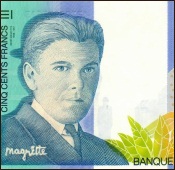 Prior to the advent of the Euro, I lived in the Netherlands and then Belgium. I clearly recall how the money looked: the Dutch Guilder was always emblazoned on beautiful banknotes, each denomination a magnificent manifestation of national probity and pride. My mind’s eye is particularly drawn to the 50 guilder note, notable for featuring a bright yellow sunflower. I also thought the Belgian Franc was a particularly noble currency; the 500 franc note remains my favourite piece of numismatic art as it bears the portrait of Rene Magritte and contains a tribute to his work. I wish I had kept one; I would have tucked it safely in my wallet along with my Hong Kong dollar and Jersey pound notes as a souvenir of my travels.
Prior to the advent of the Euro, I lived in the Netherlands and then Belgium. I clearly recall how the money looked: the Dutch Guilder was always emblazoned on beautiful banknotes, each denomination a magnificent manifestation of national probity and pride. My mind’s eye is particularly drawn to the 50 guilder note, notable for featuring a bright yellow sunflower. I also thought the Belgian Franc was a particularly noble currency; the 500 franc note remains my favourite piece of numismatic art as it bears the portrait of Rene Magritte and contains a tribute to his work. I wish I had kept one; I would have tucked it safely in my wallet along with my Hong Kong dollar and Jersey pound notes as a souvenir of my travels. I am a curmudgeon; I am often accused by people near and dear to me of being “too grumpy”. “Cheer up,” I’m told. “Always look on the bright side of life,” is a cliché and a song I’m familiar with; the sentiment pervades so far that the anthem has made it to the football terraces across the land, and sometimes it’s even deployed at funerals. “Don’t worry, be happy”, Bobby McFerrin tells us. A popular logo featuring a yellow smiling face advises us to “Have a Nice Day”. In contrast, Oscar the Grouch on “Sesame Street” is shown to be an unpleasant character, who invites visitors to “scram”. To be grumpy is to invite opprobrium, to be called a “killjoy” or “buzz killer”. However I recall a saying a teacher once told me: “The difference between an optimist and a pessimist is that the pessimist is better informed.” Had there been more analysis of the downside risks associated with the Euro, if people had thought about the bad as well as the good that would flow from it, perhaps we wouldn’t be in the current crisis. Pessimistic people are vital in order to ensure that a valid analysis of the hazards takes place: otherwise people have a tendency to float off on clouds of fancy and fantasy which lead them to eventual disaster.
I am a curmudgeon; I am often accused by people near and dear to me of being “too grumpy”. “Cheer up,” I’m told. “Always look on the bright side of life,” is a cliché and a song I’m familiar with; the sentiment pervades so far that the anthem has made it to the football terraces across the land, and sometimes it’s even deployed at funerals. “Don’t worry, be happy”, Bobby McFerrin tells us. A popular logo featuring a yellow smiling face advises us to “Have a Nice Day”. In contrast, Oscar the Grouch on “Sesame Street” is shown to be an unpleasant character, who invites visitors to “scram”. To be grumpy is to invite opprobrium, to be called a “killjoy” or “buzz killer”. However I recall a saying a teacher once told me: “The difference between an optimist and a pessimist is that the pessimist is better informed.” Had there been more analysis of the downside risks associated with the Euro, if people had thought about the bad as well as the good that would flow from it, perhaps we wouldn’t be in the current crisis. Pessimistic people are vital in order to ensure that a valid analysis of the hazards takes place: otherwise people have a tendency to float off on clouds of fancy and fantasy which lead them to eventual disaster. My weekday commute takes me through Armley, which lies to the west of Leeds city centre. For the past several weeks, a large billboard which generally advertises a pets and aquarium store has been obscured by a poster which stated the following: “Golf is a Passport for a Dirty Weekend Away with the Lads, Wake Up Girls, a Naive Wife”. The sign bore the mysterious initials “TUD”. Today, this sign was replaced by another one, also signed off by “TUD”, which showed some blurry photos of restrooms supposedly taken by Heathrow Airport’s security cameras. The legend on this sign states, “Did you really think Heathrow Airport don’t have cameras here?”
My weekday commute takes me through Armley, which lies to the west of Leeds city centre. For the past several weeks, a large billboard which generally advertises a pets and aquarium store has been obscured by a poster which stated the following: “Golf is a Passport for a Dirty Weekend Away with the Lads, Wake Up Girls, a Naive Wife”. The sign bore the mysterious initials “TUD”. Today, this sign was replaced by another one, also signed off by “TUD”, which showed some blurry photos of restrooms supposedly taken by Heathrow Airport’s security cameras. The legend on this sign states, “Did you really think Heathrow Airport don’t have cameras here?” One of the most disturbing aspects of the Parliamentary expenses scandal was the fact that regret, reticence and repentance didn’t arise until the public’s gaze was fixed upon the MPs’ avarice. A refrain was often heard, “we followed the rules”; but adherence to guidelines is one thing, the morality of dipping into the public purse for say, the price of a duck house or even a lemon is quite another. The public reacted strongly to these allegations perhaps because the thought was, “Have they no shame?” Had they no idea that it is simply wrong to do such things, even if one can successfully get away with it?
One of the most disturbing aspects of the Parliamentary expenses scandal was the fact that regret, reticence and repentance didn’t arise until the public’s gaze was fixed upon the MPs’ avarice. A refrain was often heard, “we followed the rules”; but adherence to guidelines is one thing, the morality of dipping into the public purse for say, the price of a duck house or even a lemon is quite another. The public reacted strongly to these allegations perhaps because the thought was, “Have they no shame?” Had they no idea that it is simply wrong to do such things, even if one can successfully get away with it? Certainly, Mitt Romney’s positions have changed over time, but these shifts seem more to do with securing advantage rather than an exploration of Thomasian doubts. But we want a Thomas in the office, the one who is sceptical at first glance, checks his facts, but once he is secure in knowledge, carries on to quiet achievement. Thomas is reputed to have covered a greater area than any other apostle, including Syria, Persia and India; he was the only one to preach outside the Roman Empire. In 52 AD, he landed in what today is Kerala, South India and established “Seven and a Half” churches. Even there, Thomas remained doubtful: according to a 3rd century scripture called “The Acts of Thomas”, Christ commanded him in a dream to take his mission to two kings in India, one in the north, the other in the south. Thomas refused and God had to arrange circumstances by which he fulfilled his charge, gathering many converts in the process. Yet Thomas barely gets a look in at any Sunday School; the Syriac “Acts of Thomas” are not part of accepted scripture in most Christian churches. Not for him high praise or grandeur, just the occasional work of art and some quiet rememberance. Who would want to follow Thomas? Who in the pursuit of high office and the exaltation of self that implies would want to emulate his example? Who wants to suggest that doubt is a virtue, and that being too certain implies fatal hubris? In both America and on this side of the Atlantic, we are plagued with people in leadership positions who tell us that there is no alternative and that it’s their way or the highway. But one can follow Thomas and sail in a different direction, remain with faith and yet sit alongside doubt. This embrace of uncertainty could be called prudent in a world that seems more full of data than it is imbued with wisdom. It may or may not sit well alongisde Romney’s Mormonism; quite frankly, I’m not sure.
Certainly, Mitt Romney’s positions have changed over time, but these shifts seem more to do with securing advantage rather than an exploration of Thomasian doubts. But we want a Thomas in the office, the one who is sceptical at first glance, checks his facts, but once he is secure in knowledge, carries on to quiet achievement. Thomas is reputed to have covered a greater area than any other apostle, including Syria, Persia and India; he was the only one to preach outside the Roman Empire. In 52 AD, he landed in what today is Kerala, South India and established “Seven and a Half” churches. Even there, Thomas remained doubtful: according to a 3rd century scripture called “The Acts of Thomas”, Christ commanded him in a dream to take his mission to two kings in India, one in the north, the other in the south. Thomas refused and God had to arrange circumstances by which he fulfilled his charge, gathering many converts in the process. Yet Thomas barely gets a look in at any Sunday School; the Syriac “Acts of Thomas” are not part of accepted scripture in most Christian churches. Not for him high praise or grandeur, just the occasional work of art and some quiet rememberance. Who would want to follow Thomas? Who in the pursuit of high office and the exaltation of self that implies would want to emulate his example? Who wants to suggest that doubt is a virtue, and that being too certain implies fatal hubris? In both America and on this side of the Atlantic, we are plagued with people in leadership positions who tell us that there is no alternative and that it’s their way or the highway. But one can follow Thomas and sail in a different direction, remain with faith and yet sit alongside doubt. This embrace of uncertainty could be called prudent in a world that seems more full of data than it is imbued with wisdom. It may or may not sit well alongisde Romney’s Mormonism; quite frankly, I’m not sure. I'm a Doctor of both Creative Writing and Manufacturing and Mechanical Engineering, a novelist, a technologist, and still an amateur in much else.
I'm a Doctor of both Creative Writing and Manufacturing and Mechanical Engineering, a novelist, a technologist, and still an amateur in much else.




